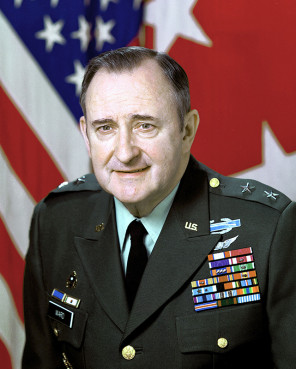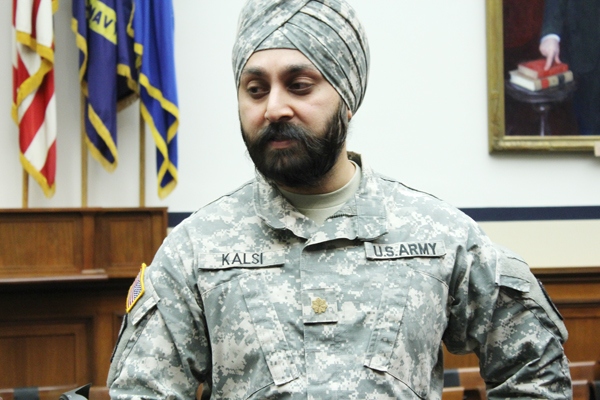(Twenty-seven retired U.S. generals delivered a letter to Secretary of Defense Ashton Carter on Wednesday (Nov. 11) asking that the military drop its ban on religious articles of faith, including the turban. This is one general’s reasoning.)
(RNS) One of the greatest strengths of our U.S. military is that it is a diverse institution that strives to reflect and project the best of our core values as a nation.
As a company commander in 1956, I was tasked with overseeing and training the first fully desegregated tank unit in the state of Delaware.
While the executive order for desegregation had been issued eight years earlier, many Americans throughout the state were still deeply divided on the issue by the time it came to be implemented. For me, desegregation of the military was always a very simple decision. We’re all equal in the eyes of God and under the law.
Sixty years later, Sikh Americans face a similar struggle. Despite the fact that Sikhs have contributed to the American fabric for generations, our nation’s armed services ban Sikh Americans from serving because they do not cut their hair or shave their beards.
The Sikh religion is a faith that emphasizes service, love and justice. Sikhs display their commitment to these ideals by maintaining unshorn hair, which includes beards and uncut hair that is wrapped in a turban.

Army Maj. Kamaljeet Singh Kalsi, who attended the hearing in his camouflage turban, said afterward that Sikhs will continue to petition Congress and the military to change the policy to prevent Sikhs from having to “choose between God and country. Nobody should be put into that situation.” Religion News Service photo by Adelle M. Banks
READ: Overlapping holidays a chance for Hindus and Sikhs to learn about each other
While militaries around the world have recognized and embraced the Sikh religious practices, since 1981 the U.S. military has had a ban in place that prohibits Sikhs from serving without abandoning their faith.
In the U.S., being forced to choose between one’s faith and service to our country is a choice that no American should have to make.
There are three Sikh American soldiers — with turbans and beards — who are serving in the U.S. Army. These three individuals — Maj. Kamal Singh Kalsi, Capt. Tejdeep Singh Rattan and Spc. Simranpreet Singh Lamba — have deployed and served in operating positions, received awards and promotions, and have helped protect and save the lives of fellow Americans.
However, each of these soldiers had to fight an incredibly arduous battle and seek special accommodations from the military to serve.
The Pentagon amended its religious accommodation policy last year, but rather than fix this problem the Pentagon exacerbated it. Now Sikhs must cut their hair and shave while waiting for the accommodation process to be approved. This process can take months and is determined on a case-by-case basis.
READ: Religious people are more likely to be veterans: Two graphs on veterans in American religion
The core argument against Sikhs serving today is one that focuses on the disruption of unit cohesion. Sadly, this argument is similar to the dissent I heard in Delaware nearly 60 years ago. My fully desegregated unit had no problems with integration whatsoever and went on to successfully serve for years after I left the unit.
Based on my firsthand experiences and observations, desegregation did not threaten the esprit de corps, nor did it pose a threat to the stability of our military. The same logic applies today for our Sikh-American neighbors, classmates and colleagues, who deserve and rightfully demand the same opportunity.

Maj. Gen. William Francis Ward Jr. served as chief of the Army Reserve from 1986-1991. Photo courtesy of the Sikh Coalition
Today, 27 generals, including me, signed a letter demanding that the Pentagon drop the ban. These letters add to the growing chorus, which was previously joined by 105 members of Congress, 15 senators and 20 national interfaith and civil rights organizations, all of whom also signed letters last year in support of American Sikhs’ right to serve.
Not allowing minorities to serve in the military because of the color of their skin was simply the wrong thing to do, and disallowing minorities to serve today because of their faith is absolutely no better. It goes against the values that each and every American service member has fought to protect, and it runs counter to the ideals that we as Americans cherish most.
(Maj. Gen. William Francis Ward Jr. served as chief of the Army Reserve from 1986-1991.)
YS/MG END WARD





